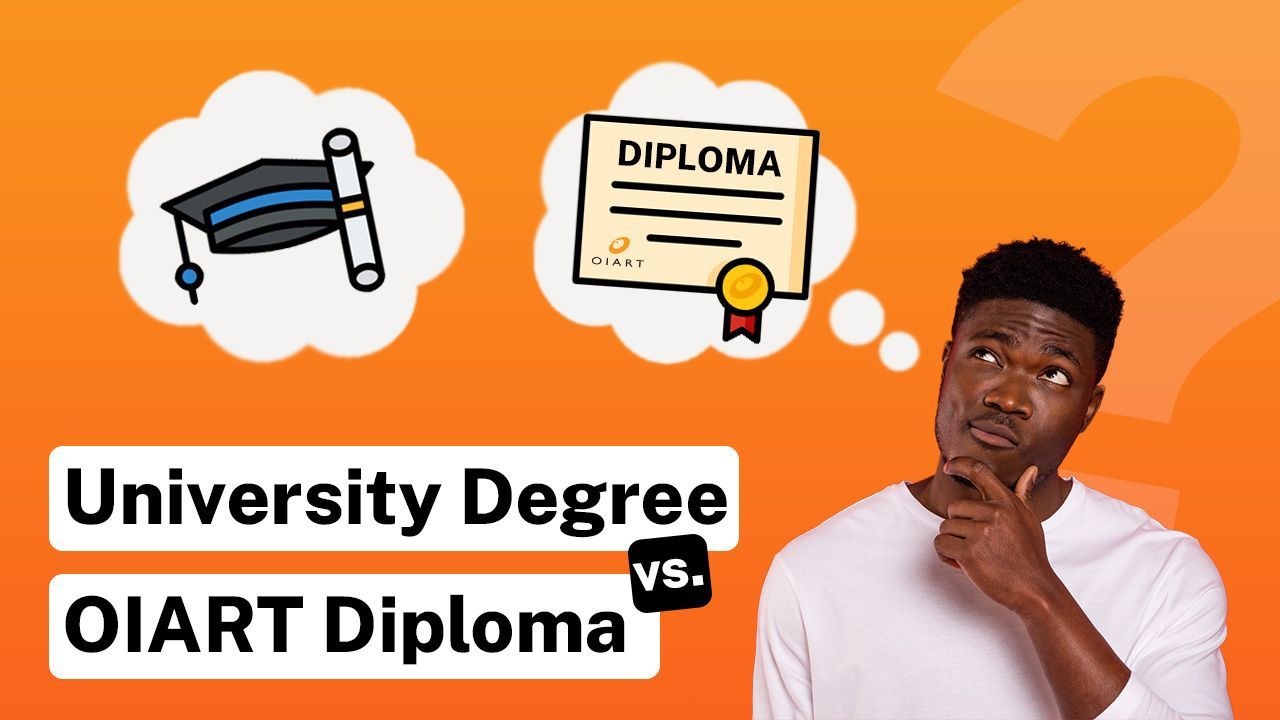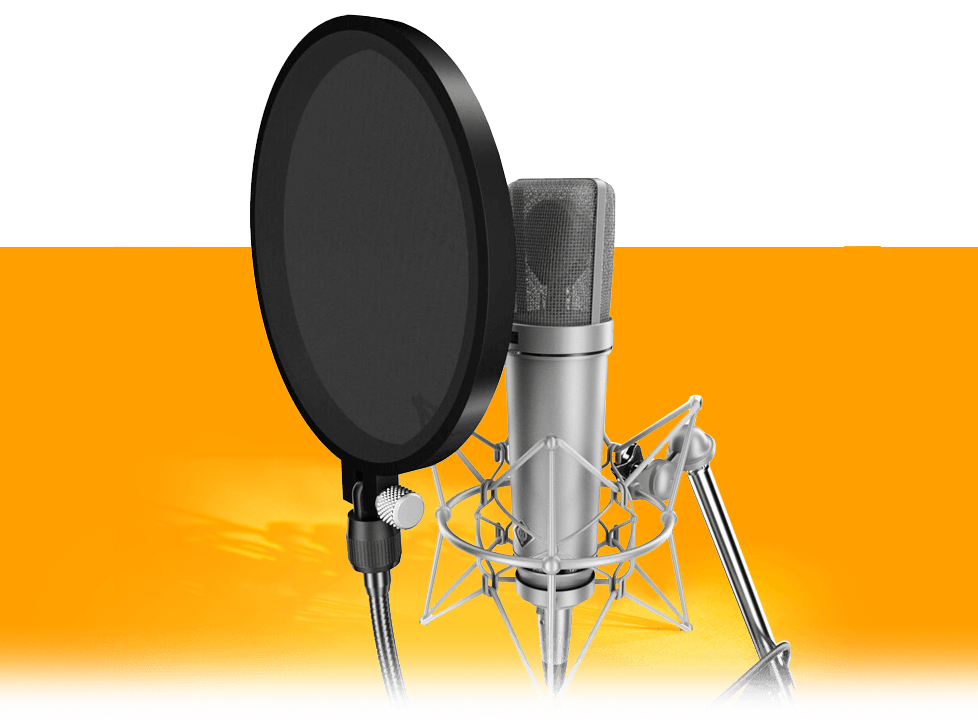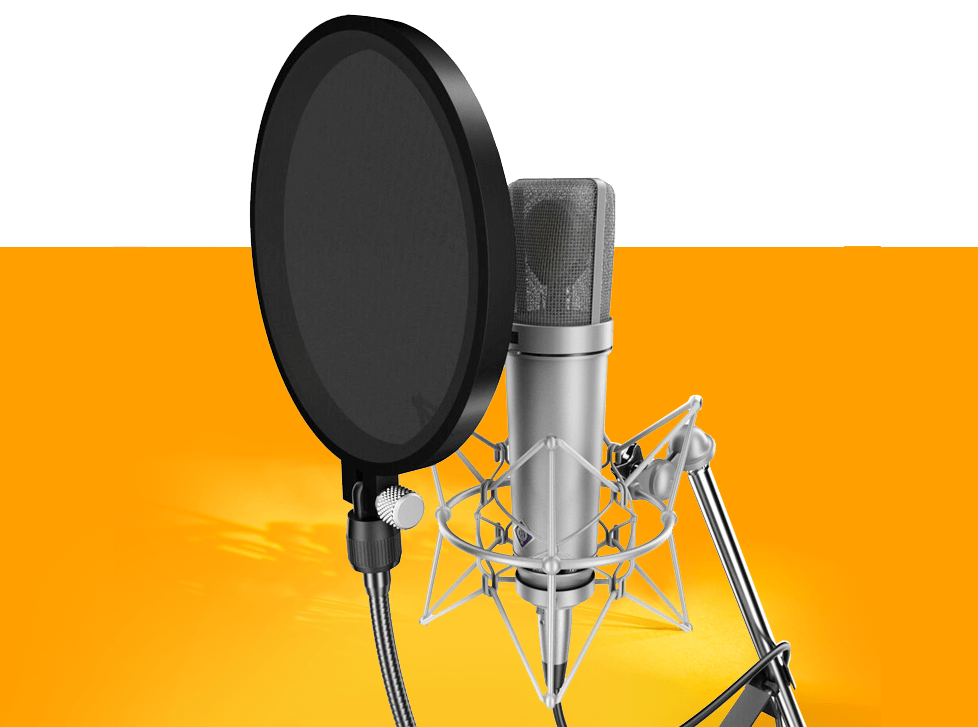University Degree vs. OIART's Diploma: What’s the Difference?
Jeremy Alves | February 26, 2024

Deciding to pursue an education in audio and sound engineering can be a great choice, but you’re immediately faced with another decision: what type of course should you attend?
There are a few different types of music production and engineering schools to choose from. You can choose from a certificate audio program, a diploma program, or a university degree.
How do you navigate these different options? It’s a complex but important decision, so we’ll guide you through the major options, including the pros and cons, to help you make the right choice for your career.
We’ll also show you why choosing OIART is the right choice if you’re passionate about audio and sound engineering.
Audio Engineering Schools: Certificate vs. Diploma vs. Degree
Choosing between a certificate, diploma, or degree program depends on understanding the differences and finding the best choice for your career goals, time, and budget. Let’s break down these three types of programs to help you hone in on the right choice for your career.
What is a Certificate Program?
Certificate programs are usually short-term courses focusing on a specific skill, offering practice knowledge and hands-on experience relevant to the given specialty. For example, a music engineering course will provide a certificate specific to your new knowledge of engineering music.
These programs can vary in length but are generally shorter than diploma and degree programs; they may run from a few weeks to a few months. As such, they are generally the least expensive option of the three types of programs.
Students looking to gain a quick, targeted understanding of specific aspects of audio engineering, such as mastering or live sound, may want to consider a certificate program.
What is a Diploma Program?
An audio engineering or music production diploma is earned by completing a program that’s typically more comprehensive than a certificate program but not as extensive as a degree. Focused music engineering programs offer a diploma at graduation to showcase the new skills you’ve learned.
Your diploma indicates to employers that you’ve learned a broad range of topics within the field alongside hands-on experience.
These programs typically last for one or two years. They are ideal for students seeking a balance between gaining a strong understanding of audio engineering, hands-on experience, and time effectiveness.
Another perk of the shorter one-year programs with access to top-of-the-line equipment, commonly means you’ll be working with the same gear you’ve worked on in school.
What is a Degree Program?
Universities offer degree programs and include associate’s, bachelor’s, and master’s degrees. Audio engineering colleges offer the most comprehensive education option and include a well-rounded education, which doesn’t only include audio engineering courses.
These degrees dive into the theoretical aspects of sound and engineering, including practical training and hands-on experience. Programs cover topics such as acoustics, studio techniques, sound design, and potential aspects of business management.
However, university degrees can range between 2 to 6 years, depending on the level of degree you’re pursuing. Bachelor’s degrees are the most commonly sought after and generally take four years to complete. Costs will also typically be higher than in diploma and certificate programs.
A degree program is a great choice for those looking for a thorough, in-depth education in audio engineering or ready to advance an existing career in the world of audio.

Pros and Cons: Earning a University Degree
Earning a university degree in audio or music engineering can be a great decision for many students looking to build a career in the world of audio. Attending a sound engineering college and earning an associate’s, bachelor’s, or master’s degree can give you a strong foundation and a head start in your career.
However, it’s not without some major drawbacks. Let’s dive into the specifics to help you decide if it’s the right choice for you.
Pros
- In-depth knowledge and skills training: Perhaps the biggest benefit of attending an audio or music engineering college is the depth and breadth of course material. You’ll receive a well-rounded education beyond audio engineering, alongside diving deep into the principles of sound engineering.
- Networking opportunities: Universities are able to connect you with working professionals, alums, and peers who may become valuable contacts in the future. While many of these benefits are available in other programs, universities shine in this respect.
- Career opportunities: Many employers require a Bachelor’s degree, even though you may learn the right skills with other options. Consider how you want to build your career, and lacking a university degree might hinder your options.
- Earning potential: Like other industries, a university degree will typically increase your earning potential. You might still start off with the same annual income as someone with a diploma, but over time, you’ll have the credentials to exceed entry-level positions.
- Focus on soft skills: Universities go beyond industry-specific skills and provide a well-rounded education, including soft skills. Sharpening critical thinking, problem-solving, and communication skills will go far in helping you throughout your career. Employers also tend to expect bachelor’s degree holders to have strong reading and writing communication skills.
Cons
- Costs: One of the biggest drawbacks of a university degree is its costs. Even with scholarships, you’ll still need to pay for books, equipment, and the remaining tuition. You’ll also have to cover living expenses while being a full-time student.
- Time commitment: Compared to a diploma music production course, you’ll be committing to a much longer program before you can enter the workforce. A bachelor’s degree will take four years to complete and absorb more hours per day during that time frame.
- Theoretical knowledge vs. practical skills: Depending on the specific school, you may end up learning too much theory and not enough practical knowledge. Theory-oriented curriculum can still be valuable, but if you don’t have the skills to start working after graduation, you may still need to attend certificate or diploma recording schools.
- Core requisites: Core classes contribute to sought-after soft skills and overall education, but they also delay getting into your major’s focus. Students should be aware of the specific degree's requisites and when they’ll start learning audio engineering material.
- Keeping up with a rapidly changing industry: Audio engineering is a quickly changing industry, especially as advancements in AI and machine learning are being applied. While not always true, some academic programs can struggle to keep up with the latest technologies, affecting your career after you graduate.
Pros and Cons: Earning OIART’s Diploma
Here at the Ontario Institute of Audio Recording Technology (OIART), we’ve developed diploma programs with a range of focuses to help you get started working in the industry faster than a university degree and costing considerably less.
However, there are still some drawbacks to be aware of as you’re choosing the best way to start your career in production in music.
Pros
- Specialized curriculum: Audio engineering and live sound schools focus only on specialized material, removing core requirements and other topics that deviate from the diploma program’s focus. While this can also be a drawback, having a focused specialty streamlines your education and cuts costs.
- Industry connections: OIART has strong connections throughout the world of audio production to help you find a career after graduation. Your peers may also end up being valuable industry contacts as graduate’s careers progress.
- Focus on hands-on experience: Our audio or music engineering course isn’t just about theory; you’ll gain plenty of hands-on experience with the software and hardware necessary to thrive.
- Faster courses: Music producing schools focusing on a certificate or diploma are much faster than a university degree. While length varies based on the specific course, you can be working in the field in a year or two rather than four.
- Smaller financial commitment: Tuition costs vary based on the OIART diploma program, but you can expect them to be much less than a university degree. You may also be able to maintain a job and other responsibilities during the program.
- No Filler Courses: If you attend an audio engineering program with a diverse curriculum but later want to change your career for example: music production, you will not lack any skills to make the change.
- Increased Career Options: Our Audio Engineering school prepares you specifically for producing music, working in Live Sound and Audio for Film and Television. If you decide to pursue live sound engineering later, for example, you can easily make the shift.
Cons
- Narrower focus: Music producer programs focus on the skills you’ll need to work in the field as a producer. You’ll have minimal training on soft skills and will be completely without the core requisites involved in a university degree. While we also listed this as a pro, for some, it will be a con.
- Less emphasis on soft skills: Our program still includes some soft skills, but we won’t focus specifically on reading and writing, critical thinking, and other soft skills you’ll gain in a university setting.
- Intensive course load: Our courses can move quickly so we can cover all necessary ground to prepare you for entering the workforce. This workload can be intensive for some students, and you should be ready to focus on the program throughout its duration.
Why Choosing OIART is the Right Choice
When it comes to your future career in sound and audio engineering — it’s important to gain the hands-on experience needed to excel. That’s why learning at the best audio engineering and production school in North America can make all the difference.
Here are just a few of the reasons why OIART should be at the top of your list if you’re interested in a music and sound engineering program:
- Specialized in sound and audio engineering: OIART specializes in audio studies. You’ll learn everything from industry tools, sound design, music production, acoustics, and more in a specialized all-things audio environment.
- One-to-one access to instructors: Smaller class sizes ensure students have one-to-one access with their instructors for mentoring and tutorials.
- State-of-the-art facilities: Take advantage of our state-of-the-art facilities, including eight real-world environments using leading-edge technology.
- Gain hands-on experience: Learn best practices while developing valuable industry skills through hands-on experiences.
- Receive job placement assistance: All graduates receive job placement assistance and lifelong career support from OIART.
- Earn a valuable Diploma at a fraction of the cost: You can complete OIART’s 11-month program at a fraction of the cost when compared to traditional college and university programs.
Ready to Start Your Career in Sound Engineering? Enroll in OIART’s Diploma Programs
Not everyone who wants to be a music producer or audio engineer wants to invest the time and money necessary to earn a degree. Certificate and diploma programs are a great option to gain the skills you need to start working in the industry. If necessary, you can consider a university degree in the future once you’re already in the field.
OIART offers industry-recognized sound engineering programs to help students gain the knowledge and practical skills to start working in the industry.
Ready to get started? Get more information about OIART by checking out our website or contacting our admissions specialist, Jeremy today!
Ready to Start?
OIART's Audio Program Includes:
✓ Small Class Sizes
✓ On Site Facilities
✓ Industry Leading Instructors
✓ Post Grad Support & Guidance
✓ Exclusive 11 Month Program
Top Reasons Why You Should Choose OIART.
Have Questions?
If you have questions about our audio engineering and music production program or would like to book a tour, we would be pleased to speak with you.
Text Us: 519.200.4151
Share This With a Fellow Music Lover
Apply in 4 Steps!
Step 1: Click apply now.
Step 2: Answer 8 questions about yourself.
Step 3: Upload supporting documents.
Step 4: That's it! You are done.
Share this with fellow music lovers


